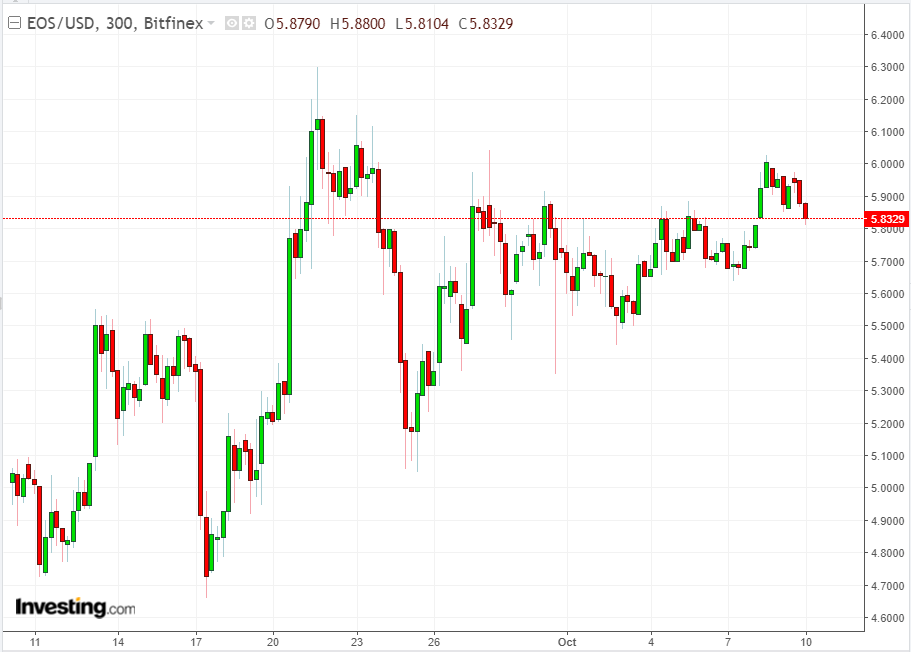In what looks like it could be a blow to one of its key founding protocols, decentralization, the EOS cryptocurrency recently become embroiled in a scandal based on alleged collusion between an Asian cryptocurrency exchange and voters for EOS block producers. Reports have emerged that the fifth most popular cryptocurrency by market cap, valued at nearly $5.4B at time of writing, was in hot water over accusations that the Singapore-based Huobi exchange may have tried to help itself and some other block producers gain votes that would enable them to manipulate and control the verification process for EOS's proof-of-stake system.
In late September, Twitter user Maple Leaf Capital tweeted:
"Recently, an internal excel document from Huobi (one of the BPs [block producers]) is circulating in the Chinese community. This file documents the collusion, mutual voting, and pay-offs that occur amongst the Chinese BP community. I'm working on getting the file."
For those unfamiliar with the term BP, block producers are meant to be the decentralized entities that govern the EOS blockchain as well as produce the actual digital blocks that make up the cryptocurrency's blockchain. The accusation claims that Huobi voted for 20 specific block producers and in return, 16 of them voted for Huobi.
Huobi has denied the claims:
“Based on the initial investigation, there were no financial contracts involved between Huobi and any third party. The investigation is still on-going and therefore, we seek your patience and co-operation in this matter.”
Not long after the EOS news broke, Apple quietly removed an allegedly malicious cryptocurrency wallet, EOSIO Wallet Explorer, from its App Store, after some users complained that their EOS tokens had been stolen after they used the app.

Despite the negative news, EOS continues to trade in the $5.8 range.
How serious are these allegations? Would better technology governance have insured something like this couldn't have happened?
Issues of Trust and Regulation
Exchanges should be handling custody as if all their coins were physically in user hands, says Joshua Greenwald, CEO of LXDX, a cryptocurrency trading platform aimed at institutional investors.
“Proceeds from forks, proof-of-stake, etc. should be passed onto users as if they were dividends or interest in traditional markets. Exchanges getting paid by claiming technical ignorance has to stop!”
In an unregulated sphere such as the cryptocurrency environment, trust and governance must be practiced says Georg Greve, co-founder and president of Vereign, a blockchain-secured communication company, in much the same way they're part of doing business in more conventional financial markets.
"The principles of good governance do not change with blockchain because the acting parties are always human. It is not possible to solve social issues, such as trust and governance, purely at a technical level. The sooner the ecosystem around blockchain understands this, the sooner it will reach maturity. For EOS, I believe this means recognizing the issue is not fundamentally technical in nature.”
As has been covered here before, the cryptocurrency space has been rife with criminals preying on vulnerable investors. John Jansen, CEO of Deribit, a Netherlands-based Bitcoin derivatives exchange, notes that any part of a blockchain governance system that relies on an assumption of trust will become vulnerable to fraudulent behavior.
“In this case the necessity to trust block producers not colluding causes a huge potential issue. If votes are really worth something, one way to solve this governance problem would be to set up a public bidding process for the votes. In such a system Block Producers would advertise and pay a percentage of their return to all their pledged tokens. Market forces would take over and collusion between Block Producers would not make sense anymore.”
The EOS community is up in arms as a result of these allegations, with some mentioning that the EOS software and governance were perhaps too primitive at launch, points out Harsha Cuttari, CTO of AQUA Intelligence, an all-in-one property management system.
”The current governance model of EOS allows for block producers to be financially incentivized to cheat the system. Even though EOS GO has said many times that it would be out of integrity for block producers to pay for votes —here we are with these allegations. We cannot assume the BPs operate independently and with community goals in mind. Vitalik Buterin's concern echoes in this current situation as he articulated the vulnerability to vote buying before EOS launched.The community already suspected the block producers do not do all the things as required per their agreement and even if Huobi is not purchasing votes now, someone eventually will.”
Cuttari notes that several things must happen in order for EOS's developers to address the community’s concerns. The major criteria: transparent governance with a clearly-written and easy to understand constitution. With these in place, independent third party audits can be introduced to check for security, infrastructure and even spending . BPs would then have a responsibility to the community to be as transparent as possible.
Another factor that would help, adds Cuttari, is having location diversity, something many have mentioned before. Twitter user Maple Leaf Capital noted that at least 12 of EOS's 21 major BPs were currently controlled by Chinese entities. Having BPs placed in a broad variety of geo-political climates would assure additional diversity and could increase cooperation without fostering collusion.
